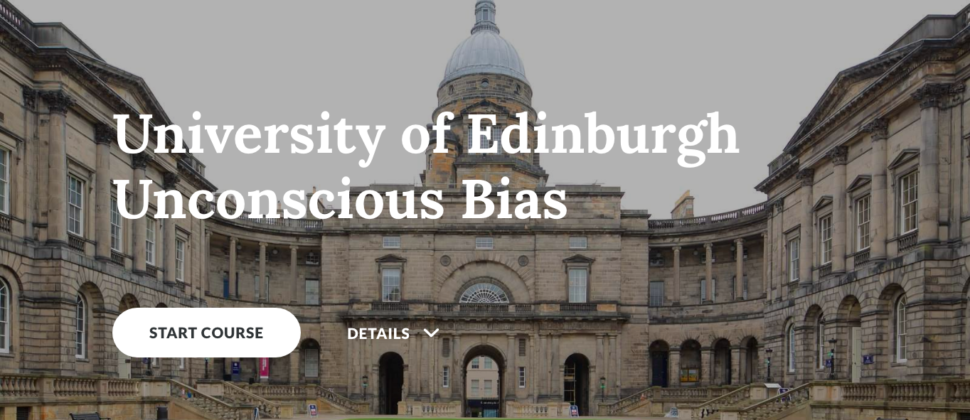University Students and Unconscious Bias
10th October 2018

The University of Edinburgh recently became one of the first universities Marshall eLearning has worked with to produce an unconscious bias course tailored for the student context. The course, designed to be taken on mobile devices, will help students to be mindful of implicit bias when evaluating staff and services.
The unconscious bias course is available for all of the University of Edinburgh’s 39,669 students to complete and is promoted as part of their course evaluation process. It helps them understand their unconscious biases by asking the tough questions about individual self-awareness of bias, the power of prejudice, and what every student can do to commit to equality, diversity and inclusion.
To get more insight into why The University of Edinburgh decided to roll out the Unconscious Bias training course to their students, we spoke to Jerrard Doran, Digital Marketing Officer from Student Systems and Administration at the University, on his views.
What was the need for the project?
Unconscious bias can affect how students complete end of course questionnaires, and how staff interpret this data. There is research which shows that there is evidence of bias against women and ethnic minorities in the completion of course evaluation surveys. This eLearning module was developed to raise awareness of unconscious bias, with the aim of mitigating its effect on data.
What were the main challenges for the project?
Technically, integrating Marshall’s Learning Management Platform with our existing systems. The purpose of doing this was out to find who had or hadn’t completed the survey, and matching the e-learning data up with individual students to see what proportion had completed the course.
How did you come across Marshall E-Learning? Why did you choose Marshall E-Learning to run the project?
The University of Edinburgh has a long-standing commitment to equality and diversity. Unconscious bias training is mandatory for staff who sit on interview panels, but we did not have a student-facing resource. To recruit a consultancy to work with, we started a competitive tender process.
When Marshall E-Learning came to interview, we felt not only did they have the experience and expertise to complete the project to our specifications within the narrow timescale available, but also had a genuine interest in the topic. They had a flexible and friendly approach to the task, and pitched it to us as more of a collaboration than a consultant/client project, which we found appealing. We also have a stringent accessibility policy for all our resources, and Marshall were able to work within that policy.
What was the approach creating the project? Were there any challenges when creating the project?
Marshall E-Learning came in to meet our group of representatives, including an academic, a student representative, and the diversity rep from our Students’ Association. We discussed what the content for the course should be, how we can best represent the students, the scope and limitations, the outcomes, and whether there should be an assessment or certificate at the end of the course.
Marshall E-Learning really led that discussion and were professional throughout. These initial meetings were not too time consuming, as Marshall knew how to get to the heart of things quite quickly.
What results did you get from the project?
We rolled the course out at the end of October 2017 and so far we’ve had good student engagement with the content. There was a feedback form supplied at the end, so the students have the opportunity to give comments on the content.
89% of students who gave feedback rated the course 4 or 5 out of 5. Students said that they enjoyed the module and understood the context. Some comments were around understanding some of the questions, but getting this feedback gave us the chance to address those issues and these have now been amended in the student platform.
What have been the main benefits of the project for you?
The main benefit for us is that we have created a resource to ensure students are aware of this important topic, which we did not previously have.
What has been the impact of the project on students / staff?
It is important to make students aware of unconscious bias and to challenge their views. But part of the exercise was around our action towards allowing bias into the data that might impact staff in any way, and the unconscious bias course has helped with that.
How was it working with the Marshall team?
They were very attentive to our needs, and in gathering exactly what we wanted for the module. They were also very good at communicating with us and were timely in replies – often within 10 minutes, which was reassuring. Although we worked closely together in a partnership, we still had power of executive decision.
Marshall E-Learning showed personal interest in the project. It was clear they had created content on this topic before, and were looking to expand their own expertise in the area. Ultimately, they wanted the best for us and the best for the partnership, so it was a pleasure to work with them.
Any other comments?
Based on student feedback, we went back to Marshall E-Learning and suggested some amendments and they went ahead and made them, so it’s nice to know there’s an ongoing relationship.
Additionally, the learning platform they provided is very aesthetically pleasing, and the platform feels very modern and of high quality – we’re really pleased.
It really felt like a partnership and it was nice to feel such a personal connection.


